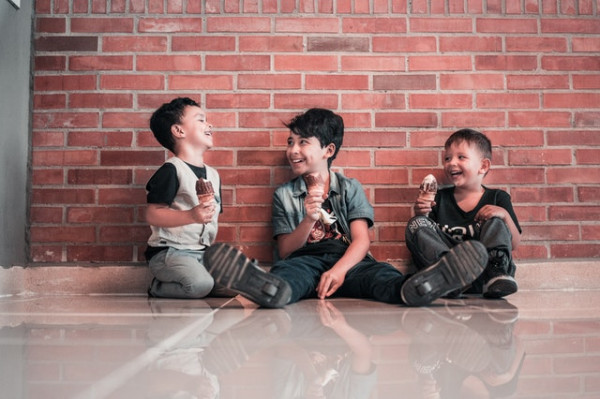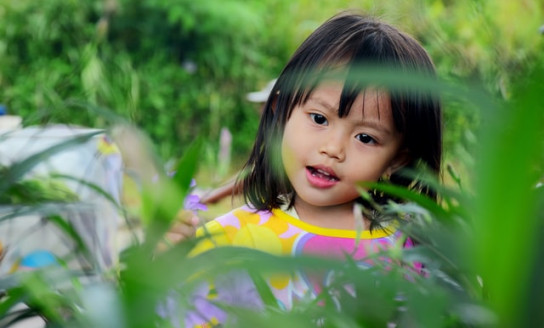Your child’s language, speech and communication
Children’s language skills improve a lot between the ages of two and five. The number of words they can say increases quickly, and they start talking more and asking questions - lots and lots of questions. They enjoy listening to stories and music, often asking for the same story or song over and over again. Sometimes they remember the words so well it almost seems they can read a book by themselves! By the time your child is ready to go to school, they should be able to speak and listen well.
Download this great booklet from La Trobe University and Health Victoria about all the things you can do to help your child's communication skills.
What your child is learning to do
From two to three years
Most children are:
- learning to use short sentences, like “me do it”
- continuing to build their vocabulary. By the age of three, they’ll have a few hundred words they can use
- learning to ask and answer simple questions
- understanding more complex sentences
- following simple directions, like “let’s put your toys away in the toy box ”
- putting something in the right place if you ask them to put something “on” “in” or “under”
- showing an interest in other children’s play.
From three to five years
Most children:
- are learning more and more words
- can understand more complex sentences, and concepts like “because”
- start using longer and more complex sentences
- can talk about things that happened in the past
- start learning to use the appropriate word endings, like -ed, -ing, -s
- start asking “why?” (at around four years)
- start to show an interest in words that rhyme, for example
- take increasingly longer turns in conversations, maybe using several sentences in a row
- may know some letter names and sounds by age five
- can recognise their own name written down and may be attempting to write their own name by age five
- can tell a short story about themselves (for example, tell you something that happened at kindy, or tell nana what they got up to at the weekend).
All children are different, and they all develop at their own pace. If you’re worried about any aspect of your child’s development, it’s a good idea to talk with your Plunket nurse or GP, your child’s early childhood teacher or educator.
How you can help your child’s language development
- Encourage your child to talk and praise them for their talking.
- Keep using ‘serve and return’ with your preschooler – when they ‘serve’ a word or words to you, ‘return’ it and wait for their response or return, and then keep it going. This helps their brain development and helps them learn about language, communication and social skills.
- Talk, talk and talk, using whatever language(s) are spoken in the home – and keep following your child’s lead. Talk about what they’re interested in, and give them time to respond.
- Answer your child’s questions – even if they ask them over and over again!
- Your child’s language skills are increasing, so see whether you can support them to take longer turns in the conversation. Don’t jump in before they’re finished!
- Expand your child’s language, using interesting words when you can. If you think it’s a word they don’t know or can’t understand, explain the meaning to them.
- Let your child choose books to share with you.
- Read to your child every day and have fun with it, using voices, different noises, and talking about the story and characters and make it exciting. Point to key words in the text as you read.
- Make your own books with your child – write the story together.
- Have fun with words and sounds. In the car, for example, you could say “I can see something that starts with a ‘sss’ sound. Do you think it’s seatbelt or road? Can you think of anything else that starts with a sss sound?” Make up games about words that start with the same sound, or make up silly words that rhyme.
- Respond to mistakes in a positive way that keeps the conversation going. If your child says “I holded the cat”, you could repeat it back with the correct word - “you held the cat – was he soft?”; if your child says “bish swimmed away”, you can say “that’s right. The fish swam away very quickly!”
- Involve your child in lots of everyday activities, like making dinner, washing the car, sweeping the floor. Talk about what you’re doing and introduce new words, like “washing” when washing the car or the dishes and “sweeping” when sweeping the floor, and make it fun!
- Play games that help with taking turns and concentrating, like hide and seek and snakes and ladders.
- Talk with your child about exciting things that are going to happen, to encourage talking about the future.
- Give your child lots of opportunities to play with other children. This is a great way to develop talking and social skills.
Read more about children's hearing, communication and speech sounds in this booklet from the Ministry of Education.
Speech development
Children’s speech generally gets easier to understand as they get older. Here’s a guide:
- by two years of age children can be understood by familiar adults most of the time.
- by three years of age children can be understood by unfamiliar adults most of the time.
- by four years of age children can be understood by unfamiliar adults almost all of the time.
- by five years of age children can be understood by unfamiliar adults all of the time.
Tips for speech
- Respond to what your child is saying, not how they’re saying it – this will encourage them to keep talking with you.
- You can help your child’s speech (if they say things wrong) by repeating them correctly in a way that responds to what they’re trying to say. For example, if your child says “yum tate” instead of “yum cake”, repeat back to them “Yes, it’s a really yummy cake.”
- Get face to face with your child so they can see your mouth when you talk.
By age three
Most children:
- understand instructions containing three key words, like “please pass me the spoon and the big cup”
- use a vocabulary of several hundred words, including describing words like “big”, “red” and “little”
- can combine three or more words into a sentence - “What’s daddy doing?”
- play imaginative games, like pretending a block is a phone
- can talk about things that are not physically present
- take an interest in other children’s play and sometimes join in
- take an interest in playing with words, eg, rhyming words
- are starting to recognise a few letters
- can be understood by unfamiliar adults most of the time, eg, the librarian or relatives they don’t see often.
By age four
- understand more complex language structures – “why... because”, for example
- ask lots of ‘why”, what’, and ‘where’ questions to get new information
- take part in longer and more complicated make-believe play sequences, like buying a ticket, going on the bus, getting off at the right stop and then getting back on
- enjoy simple jokes – even though their jokes may not make sense!
- can recognise their own written name
- know some letters
- can recognise some printed words in the environment, like stop signs
- are starting to use talking to make friends and to solve problems
- can talk about what they’ve done and what they might do, for example they can tell Poppa about their trip to the park, then talk about what they want for dinner
- can be understood by unfamiliar adults almost all of the time.

By age five
Most children:
- understand and use more concept words, like ‘tallest’, ‘same’, ‘bigger’, ‘medium’
- can respond to instructions while busy doing something else
- generally use complete, well-formed sentences
- are still developing some aspects of more complex language structure – they might use runned instead of ran, for example
- are able to take turns in much longer conversations
- will ask the meanings of words, and try to use new words
- are able to retell stories they’ve heard in the right order, using some story phrases like “once upon a time” and “the end”
- are able to ask for help appropriately, eg, “excuse me can I have....?”
- are able to adapt their talking to a listener’s level of understanding, when talking to a baby brother or sister, for example
- are able to identify first sounds in words - “puku starts with p”
- are starting to link letter names with letter sounds - 's' = ‘ssss’
- can recognise some familiar written words
- can write their own name
- can be understood by unfamiliar adults all of the time. A few sounds may still be developing, like th, r, l and some consonant blends, like string, cloud, spider, tree.
Read more about speech and language development
